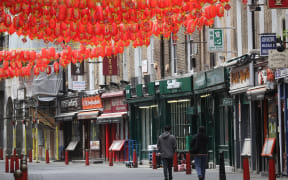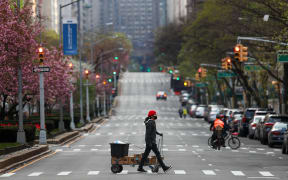China's Wuhan has revised its death toll by 50 percent, protests have erupted in Mexico after a spate of suspected Covid-19 deaths among workers, Canada's borders restrictions with US look set to be in place for a long time.
As Covid-19 spreads around the world, it can be daunting keeping up with the information. For RNZ, our responsibility is to give you verified, up to the minute, trustworthy information to help you make decisions about your lives and your health. We'll also be asking questions of officials and decision makers about how they're responding to the virus. Our aim is to keep you informed.
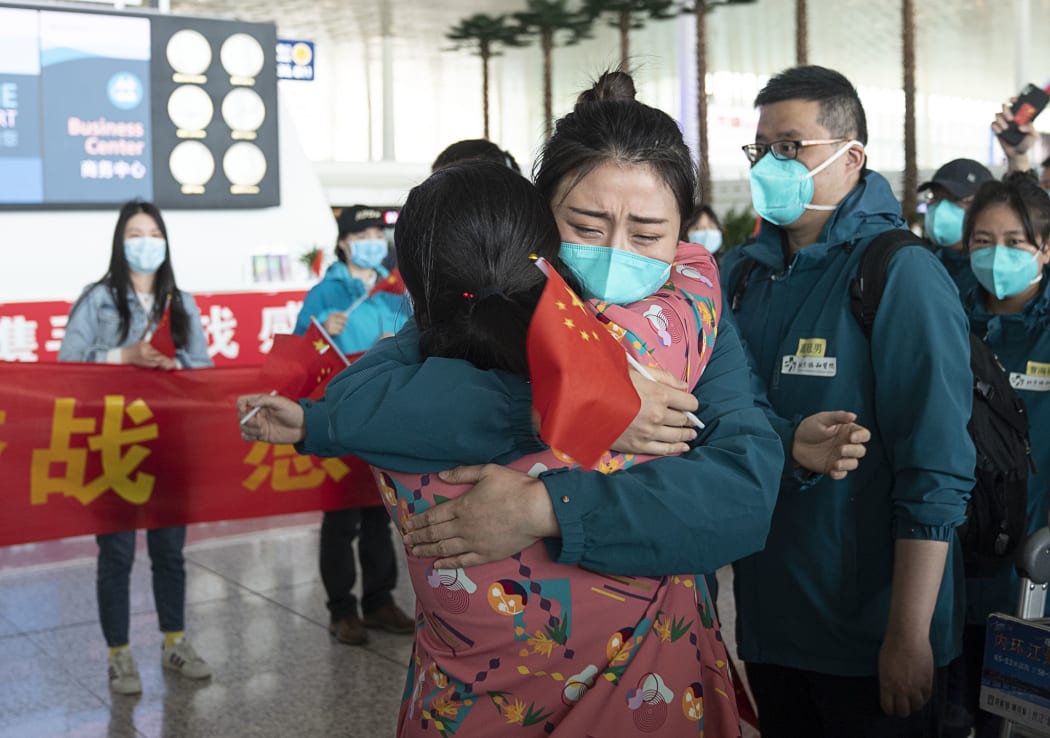
A medical worker from the Peking Union Medical College Hospital bids farewell to a local medical worker at the Wuhan Tianhe International Airport in Wuhan, capital of central China's Hubei Province, April 15, 2020. Photo: Xinhua / Xiong Qi / AFP
The total number of confirmed cases across the world reached 2,159,267 and deaths from Covid-19 globally passed 145,000.
Here are the countries with the most infections, according to Johns Hopkins University Center for Systems Science and Engineering's map of the coronavirus.
- United States 671,425 cases, 33,286 deaths
- Spain 184,948 cases, 19,315 deaths
- Italy 168,941 cases, 22,170 deaths
- France 147,091 cases, 17,941 deaths
- Germany 137,698 cases, 4052 deaths
- United Kingdom 104,148 cases, 13,759 deaths
- China 83,753 cases, 4636 deaths
- Iran 77,995 cases, 4869 deaths
- Turkey 74,193 cases, 1643 deaths
- Belgium 34, 809 cases, 4857 deaths
China's Wuhan city, the epicentre of the coronavirus outbreak, had revised up its death toll by 1290 (an increase by 50 percent), according to state-run CCTV.
Local officials said early reporting there had been delayed and inaccurate. Wuhan also revised up confirmed cases by 325.
Meanwhile, French President Emmanuel Macron has questioned China's handling of the outbreak, saying things "happened that we don't know about".
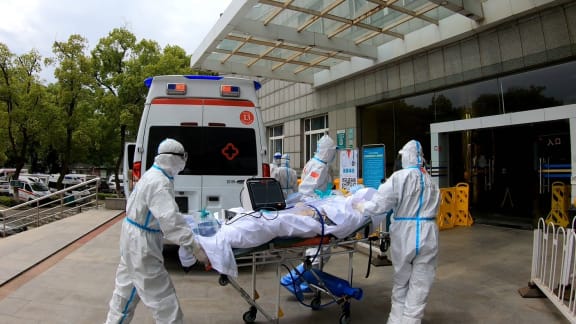
A video screenshot shows medical staff transferring a COVID-19 patient to Zhongnan Hospital of Wuhan University for further treatment in Wuhan, central China's Hubei Province, on April 14, 2020. Photo: Xinhua News Agency / AFP
Macron told the Financial Times it was "naive" to suggest that China had dealt better with the crisis.
It follows a row sparked by an article on the Chinese embassy's website that said Western countries had left the elderly to die in care homes.
The foreign ministry summoned China's ambassador to "express disapproval".
China dismissed the row as a "misunderstanding". Government spokesman Zhao Lijian said China had never made any negative comments about how France was coping with the epidemic "and has no intention of making any".
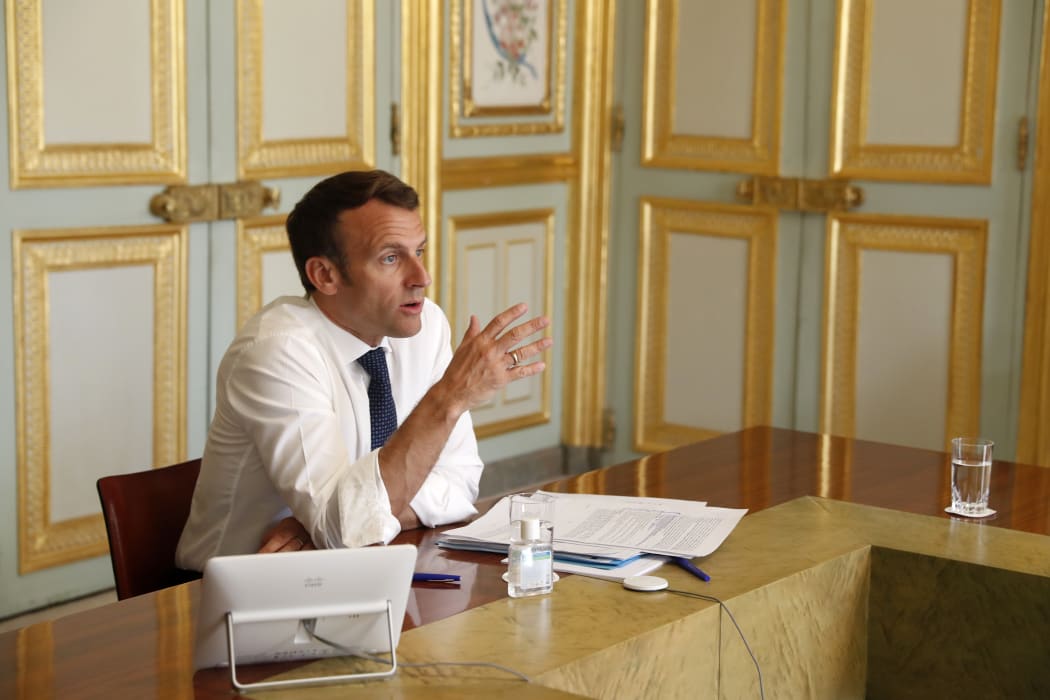
French President Emmanuel Macron attends a video conference call with the president of the Research and Expertise Analysis Committee on ongoing efforts against COVID-19 in Paris on April 16, 2020. Photo: Yoan VALAT / POOL / AFP
Asked if China's authoritarian response to bring the outbreak under control had exposed the weakness of Western democracies, Macron told the Financial Times that there was no comparison between open societies and those where truth was suppressed.
"Given these differences, the choices made and what China is today, which I respect, let's not be so naive as to say it's been much better at handling this," he said.
"We don't know. There are clearly things that have happened that we don't know about."
He said that abandoning freedoms to fight the pandemic would threaten Western democracies.
"We can't accept that. You can't abandon your fundamental DNA on the grounds that there is a health crisis."
Protests erupt along Mexican border after worker deaths
Mexico's Deputy Health Minister says the country might have as many as 55,951 people infected, twice the estimated number reported last week.
Citing government models, Hugo Lopez-Gatell said many who are infected likely did not have symptoms or were not diagnosed.
Mexican health officials reported 450 new cases and 37 new deaths from Covid-19, bringing the country's total to 6297 confirmed cases and 486 deaths.
A spate of suspected coronavirus deaths among workers for US companies operating along the border in Mexico has triggered multiple protests in recent days.
Meanwhile, dozens of protesters demanded a Honeywell assembly plant in Ciudad Juarez be closed to prevent the spread of the virus after a colleague died.
The company told Reuters one of the plant's workers died this month after being sent to self-quarantine and receive medical attention.
Car seat maker Lear confirmed "several" of its workers had died in the city this month of respiratory illnesses, while technology company Poly, also known as Plantronics, told Reuters two workers in Tijuana died this week of unknown causes. Protesting workers in Tijuana said the deaths were related to the coronavirus.
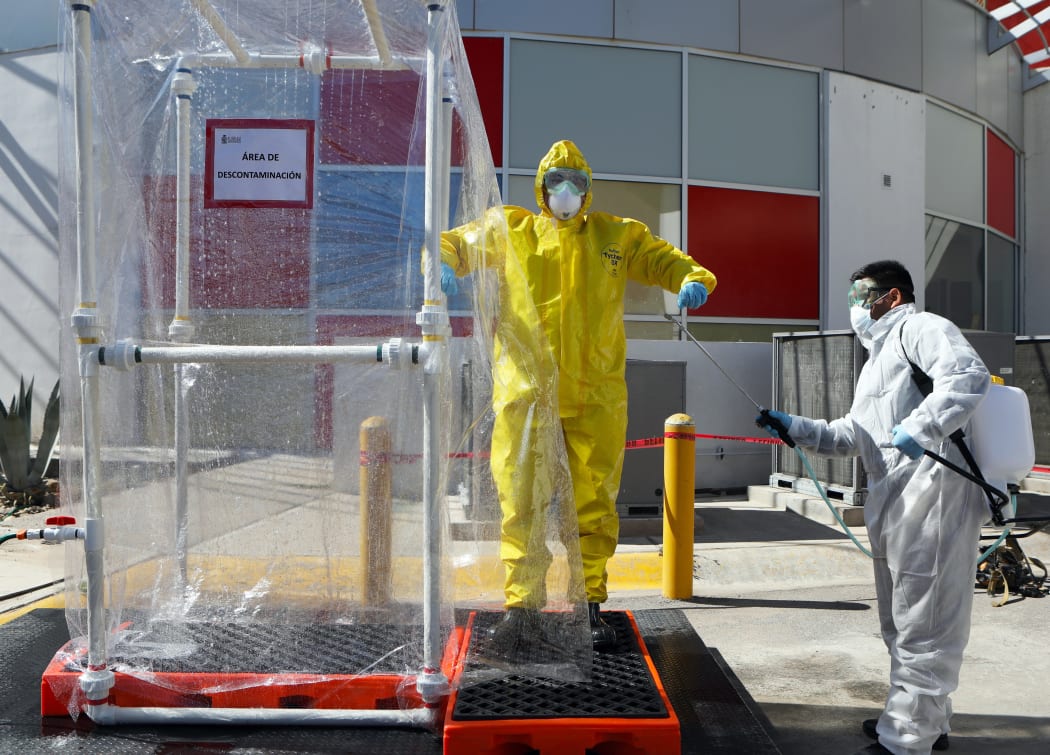
Sanitization of health workers wearing protective suits is demonstrated at a mobile hospital for people infected with COVID-19 in Ciudad Juarez, Mexico, on April 16, 2020. Photo: HERIKA MARTINEZ / AFP
Similar protests calling for safe conditions or shutdowns with full pay took place outside factories in border cities Mexicali, Matamoros and Reynosa in recent days after the Mexican government ordered non-essential industries to suspend operations.
Although Covid-19 had not been confirmed as the cause of the death of its worker, Honeywell said the worker was turned away from work on April 2, after failing a medical screening.
The company did not give the date of the death, but said it closed the factory two days for cleaning after the worker went into quarantine.
Lear said in a statement to Reuters several employees at its Ciudad Juarez operations had died of complications from respiratory illness, but declined to say how many.
It said it halted all employee-related activities in the city by April 1.
That appeared to be in line with Mexico's declaration of a health emergency on March 30, requiring companies to cease operations if their activities are deemed non-essential.
The government is investigating why 15 percent of companies with non-essential activities had refused to stop work, deputy health minister Hugo Lopez-Gatell said, warning that failure to comply could be a crime.
In Tijuana, a manufacturing hub across from San Diego that has registered 271 cases of coronavirus and is the region with the greatest viral transmission in Mexico, workers also protested this week after the Poly workers died.
Poly, a California-based maker of communications gear, told Reuters that the two deaths were from unknown causes and that one of the workers had not been at the plant in 30 days.
However, Poly said it had suspended operations at the plant for now. It said its products supplied essential government and healthcare businesses.
Australia restraints could last for a year
Australia's social distancing measures could be in place for another year because of the pandemic, Prime Minister Scott Morrison warned.
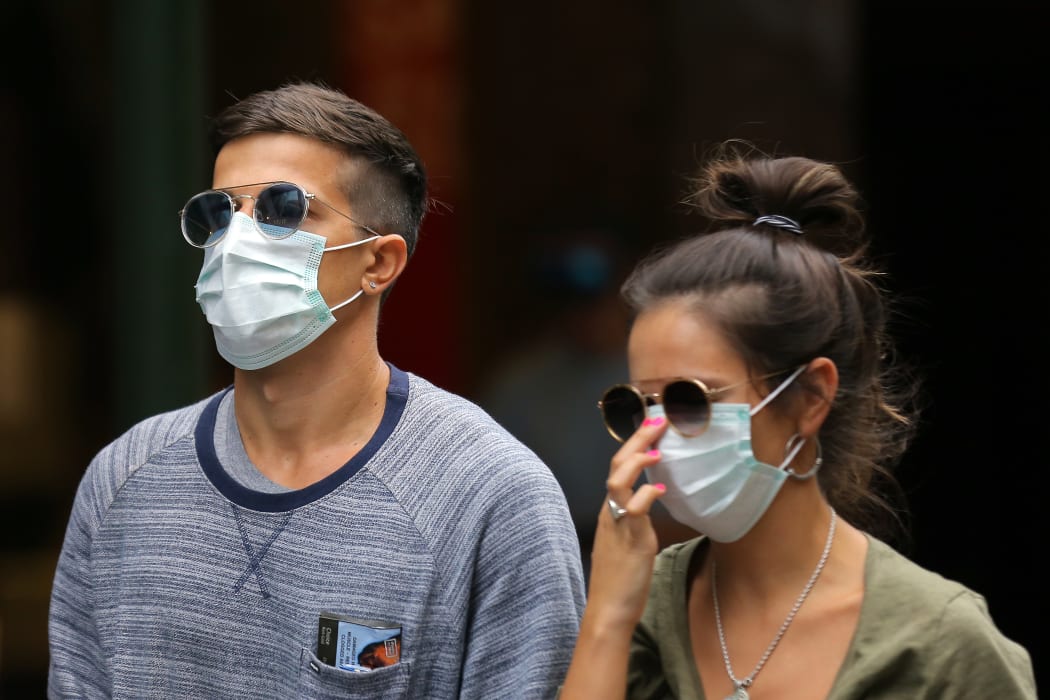
People wearing masks in Sydney, Australia, on March 28, 2020. Photo: Steven Saphore / Anadolu Agency / aFP
Australia has so far avoided the high numbers of coronavirus casualties reported around the world after closing its borders and imposing strict "social distancing" measures for the past month.
Restaurants, bars and other "non-essential" businesses have closed and public gatherings of more than two people are banned under the threat of fines and even prison, measures that are expected to double the unemployment rate by mid-year.
In response, the daily growth rate of reported new infections has steadied in the low percentage single digits, from about 25 percent several weeks ago, for a total of about 6500 infections, including 63 deaths.
Prime Minister Scott Morrison said some measures, like the rule requiring people to stand at least 1.5 metres apart, would likely remain for several months, given there was no guarantee a vaccine would be developed in that time.
"Social distancing is something we should get very used to," Morrison told radio station 3AW. "It could be a year, but I'm not speculating about that."
"Certainly while the virus is prevalent across the world (the 1.5 metre rule) should be a natural instinct."
Morrison had said on Thursday the wider social distancing measures would be in place for at least another four weeks, while advocating the reopening of schools across the country, citing medical advice that children are a low risk of transmission.
That guidance has been contradicted by several states and territories, which are responsible for schools governance, and brought a public backlash from parents and teachers concerned about exposure to the virus.
Canada's border restrictions with US to stay for 'significant amount of time'
Prime Minister Justin Trudeau says Canada's border restrictions with the United States will remain in place "for a significant amount of time".
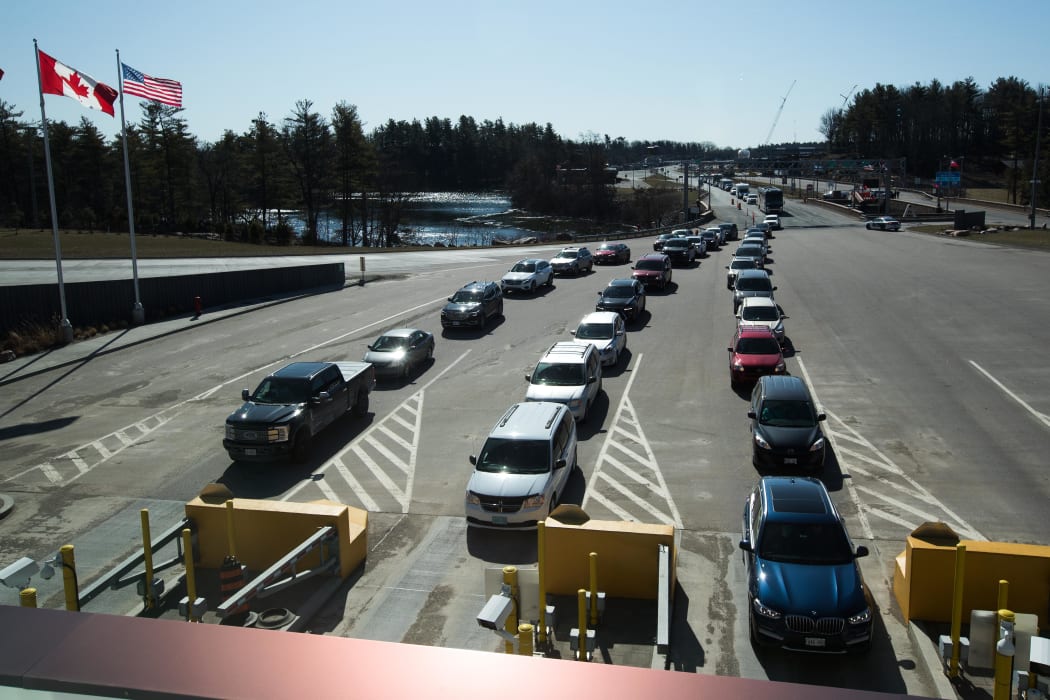
Vehicles wait at the Canadian border after the US/Canada border has been closed to all non-essential travel in Lansdowne, Ontario, on March 22, 2020. Photo: Lars Hagberg / AFP
Washington and Ottawa agreed last month to clamp down on non-essential travel while allowing trade to continue across their long shared frontier.
"As we move forward, there will be special thought given to this relationship. But at the same time we know that there is a significant amount of time, still, before we can talk about loosening such restrictions," Trudeau told a daily briefing.
US President Donald Trump told reporters the two countries were "doing well," and added: "It will be one of the early borders to be released."
A total of 1193 people in Canada had died from the coronavirus by (2300 GMT) on Thursday, data posted by the public health agency showed, while cases climbed to 30,092.
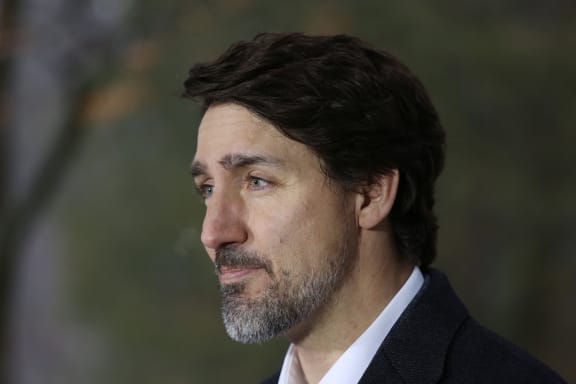
Canadian Prime Minister Justin Trudeau speaks during a news conference on COVID-19 situation in Canada on March 29, 2020. Photo: Dave Chan / AFP
Coronavirus deaths in the US rose above 33,000, according to a Reuters tally, even as President Donald Trump laid out White House guidelines for reopening the economy.
The United States is the world's worst-affected country with fatalities doubling in just a week.
Deaths rose by nearly 2200 in the past 24 hours, with a few US states yet to report, after a record single-day increase of 2507 on Wednesday. While cases of infection went up by nearly 28,000, bringing the total number of cases to more than 665,000.
Seven Northeastern states extended a shutdown to contain the coronavirus outbreak until 15 May. The extensions, and stay-at-home directives, came as Trump touted his plan for the least-affected states to reopen 1 May or sooner.
Speaking at his daily briefing on the coronavirus, Trump argued that a prolonged shutdown could be deeply harmful to the US economy and society.
"We are not opening all at once, but one careful step at a time," Trump told reporters, without himself providing details on his guidelines.
"A prolonged lockdown combined with a forced economic depression would inflict an immense and wide-ranging toll on public health," Trump said, adding it could lead to a sharp rise in drug abuse, alcohol abuse, suicide, heart disease."
The new federal guidelines recommend that states record a 14-day "downward trajectory" in coronavirus cases before beginning a three-phase process of re-opening.
The shutdown has crushed the nation's economy, sinking it to levels not seen since the Great Depression nearly a century ago as more than 20 million Americans have sought unemployment benefits.
Warning of cyberattacks amid Covid-19 crisis
A senior FBI cybersecurity official says foreign government hackers have broken into institutions conducting research into treatments for Covid-19.
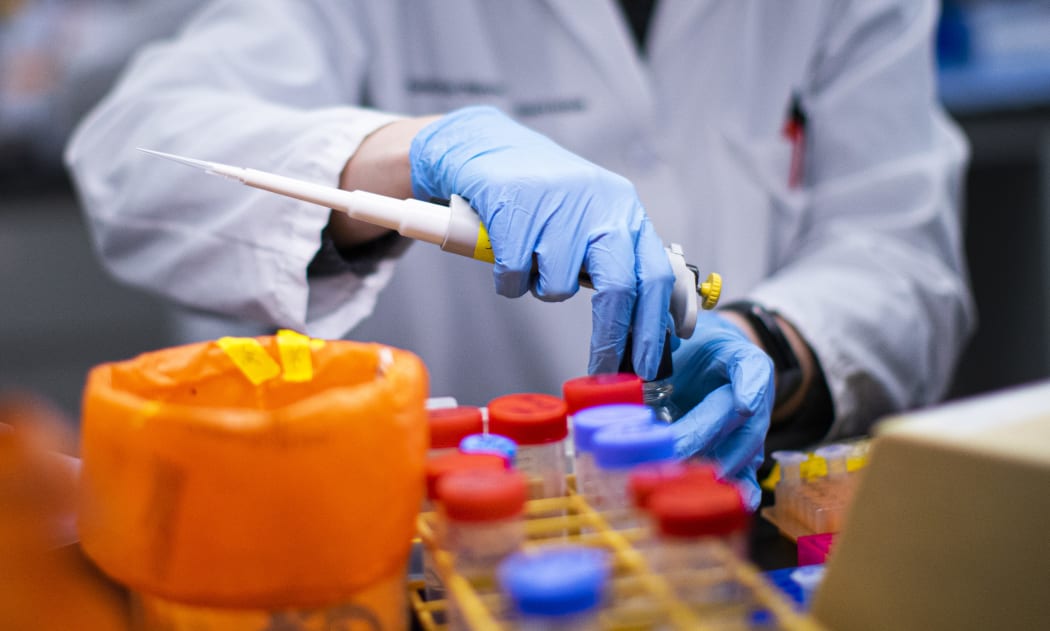
A researcher works in a lab that is developing testing for the COVID-19 coronavirus at Hackensack Meridian Health Center for Discovery and Innovation on February 28, 2020 in Nutley, New Jersey. Photo: Kena Betancur / Getty Images / AFP
Federal Bureau of Investigation Deputy Assistant Director Tonya Ugoretz told participants in an online panel discussion hosted by the Aspen Institute that the bureau had seen state-backed hackers poking around the US healthcare sector as well.
"We certainly have seen reconnaissance activity, and some intrusions, into some of those institutions, especially those that have publicly identified themselves as working on COVID-related research," she said.
Ugoretz did not name specific countries and she did not identify any targeted companies or institutions.
Ugoretz said it made sense for organizations working on promising treatments or a potential vaccine to tout their work publicly. However, she said, "The sad flipside is that it kind of makes them a mark for other nation-states that are interested in gleaning details about what exactly they're doing and maybe even stealing proprietary information that those institutions have."
The FBI declined to comment. A spokeswoman for the Office of the Director of National Intelligence had no immediate comment.
The potential for hackers to target research and healthcare institutions related to coronavirus treatments and vaccines has been on US cybersecurity officials' radar since the start of the outbreak, which began in China late last year.
Last month, Reuters identified two independent attempts by different state-backed hacking groups to penetrate the World Health Organization, which is helping to organize the global response to the epidemic.
The Czech Republic has also warned international allies of a imminent wave of disruptive cyberattacks against the country's hospitals and other parts of its critical infrastructure.
The country's NUKIB cybersecurity watchdog said the attacks, designed to damage or destroy victims' computers, were expected in coming days. Two officials with knowledge of the matter said they could begin as soon as Friday.
"The information we have available has led us to a reasonable fear of a real threat of serious cyberattacks on major targets in the Czech Republic, especially on healthcare systems," said NUKIB Director Karel Rehka.
A second Czech official said the so-called "spear phishing" campaign had been ongoing for weeks and specifically targeted Czech healthcare institutions.
"This is not spray-and-pray COVID malware stuff," the official said, referring to recent attempts by some cyber criminals to exploit the coronavirus outbreak.
NUKIB's warning means the country's critical infrastructure operators were obliged to address the threats and take action.
Czech Health Minister Adam Vojtech told senators that hackers had tried attacks on several hospitals and the ministry but had been detected. He added the intensity of attacks would likely grow, according to CTK news agency.
-Reuters / BBC
